Boranka is Back: Europe's Largest Volunteer Afforestation Action Tackles 2017 Split Fire Area
September 20, 2021 - Boranka is back! Europe's largest afforestation action launched its fourth season last weekend by tackling the 2017 Split fire area, particularly Korešnica.
The largest European volunteer afforestation action, the popular 'Boranka,' started its fourth season on Saturday in Split's Korešnica area, reports Slobodna Dalmacija.
The Croatian Scout Association, Croatian Forests, the Croatian Mountain Rescue Service, and the Split Scout Association, as the main organizers of the 'Boranka' campaign, kicked off new afforestation actions in Dalmatia. Hundreds of volunteers afforested the area that was destroyed in the 2017 fire.
The scouts of the Split Scout Association and the Spinut Seafarers' Scout Detachment, along with other citizens, were joined in the first afforestation this year by students and teachers of the School of Crafts and the School of Science in Split.
The organizers provided all volunteers with free transportation to and from the afforestation site, seedlings, protective equipment, planting tools, drinking water, sandwiches, and fruit.
Afforestation actions will be held every Saturday for the next five Saturdays, ending on Saturday, October 16, in the settlements of Donje Sitno and Žrnovnica.
In the following actions, mountaineers, athletes, HGSS volunteers, students and professors of Split faculties, members of the Croatian Navy, employees of sponsoring companies, and many other citizens will attend the afforestation actions.
The scouts, who initiated the 'Boranka' campaign in 2018 and gathered more than 7,300 volunteers, announced the continuation of 'Boranka' through educational actions through schools and other nature protection activities that will follow soon.
"We are sincerely grateful to every volunteer who joined us and helped return the forests after the Dalmatian fires. With the help of all of them, 'Boranka' is today the largest afforestation action for fires in the whole of Europe and one of the most recognized examples of good practice in caring for nature.
In addition to afforestation actions, our volunteers will irrigate the planted seedlings organized from next week to survive the dry period and heat, which in Split usually lasts until the end of October.
We started watering the seedlings with the help of the European Solidarity Forces and Croatian Forests last year. It turned out that the probability of seedling survival rises to as much as 90 percent, which is phenomenal.
In addition, we will soon start educational workshops in schools to teach children and young people about the importance of forests and the effects of climate change," announced Dan Špicer, business director of the Croatian Scout Association and the primary campaign coordinator of Boranka.
Croatian Forests, which provide seedlings and other planting material, greatly help scouts and other volunteers, and their experts educate volunteers and supervise the planting itself. HGSS volunteers are the primary logistical support in the afforestation.
The Directorate of Civil Protection provides tools and equipment for planting and other logistics. In addition, the City of Split provides free transportation by bus, and Red Cross volunteers are available in case of an accident.
Boranka has been supported for years by the European Parliament, the Ministry of Agriculture, the American Chamber of Commerce, the Embassy of Canada, UHDDR, the IMAGO agency, and the German-Croatian Chamber of Industry and Commerce.
This year, the main sponsors, symbolically called the Main WINNERS, are Raiffeisen Bank, Radenska Adriatic, and Henkel.
A new afforestation action will take place next Saturday, September 25, in the Split settlement of Donje Sitno, above the Church of the Holy Trinity.
For more, follow our lifestyle section.
Volunteer at Mljet National Park for 7 Days Beautiful Island Exploration
February 14, 2021 – Want to spend 7 days making your way across one of Croatia's most unique island landscapes? Volunteer at Mljet National Park and get a week's free accommodation, with English speaking and Croatian speaking volunteers both welcome
Recently ranked by global player Forbes as among the top five Mediterranean undiscovered islands, Mljet can be yours to explore for free if you have some free time on your hands. Mljet National Park is looking for volunteers to help clear and maintain hiking trails on the island. If you volunteer at Mljet, you'll get seven nights of complimentary accommodation, plenty of free time and the opportunity to make your way across one of Croatia's most beautiful and unique island landscapes.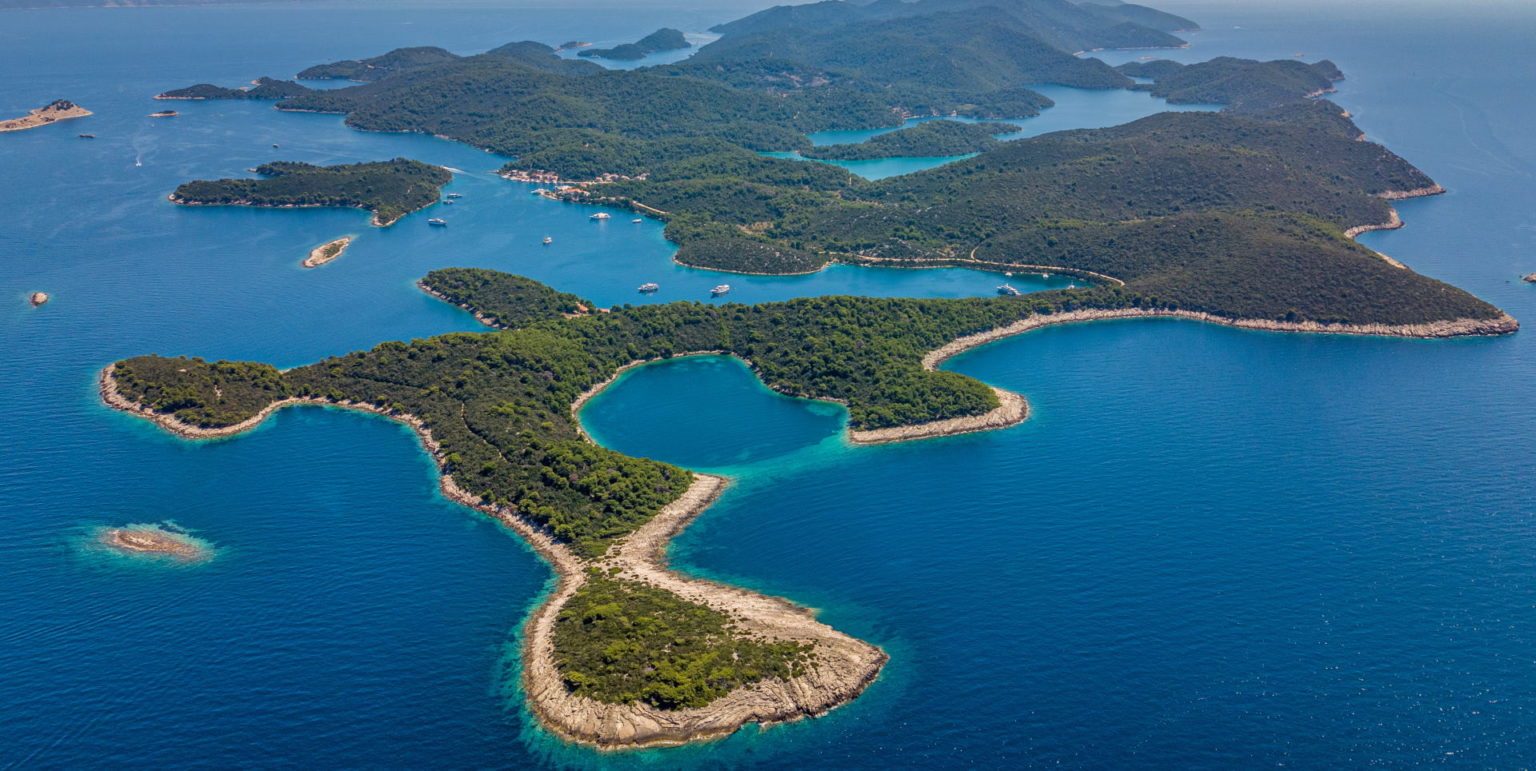 © Mljet National Park
© Mljet National Park
Those who volunteer at Mljet National Park will get to explore the entire north-west part of Mljet island, a protected area of stunning natural beauty that borders two famous saltwater lakes –Veliko Jezero and Malo Jezero which stretch 4 kilometres into the island's interior. In the middle of the largest lake, there is a small island, Melita (Sveta Marija) on which a 12th-century Benedictine monastery picturesquely sits.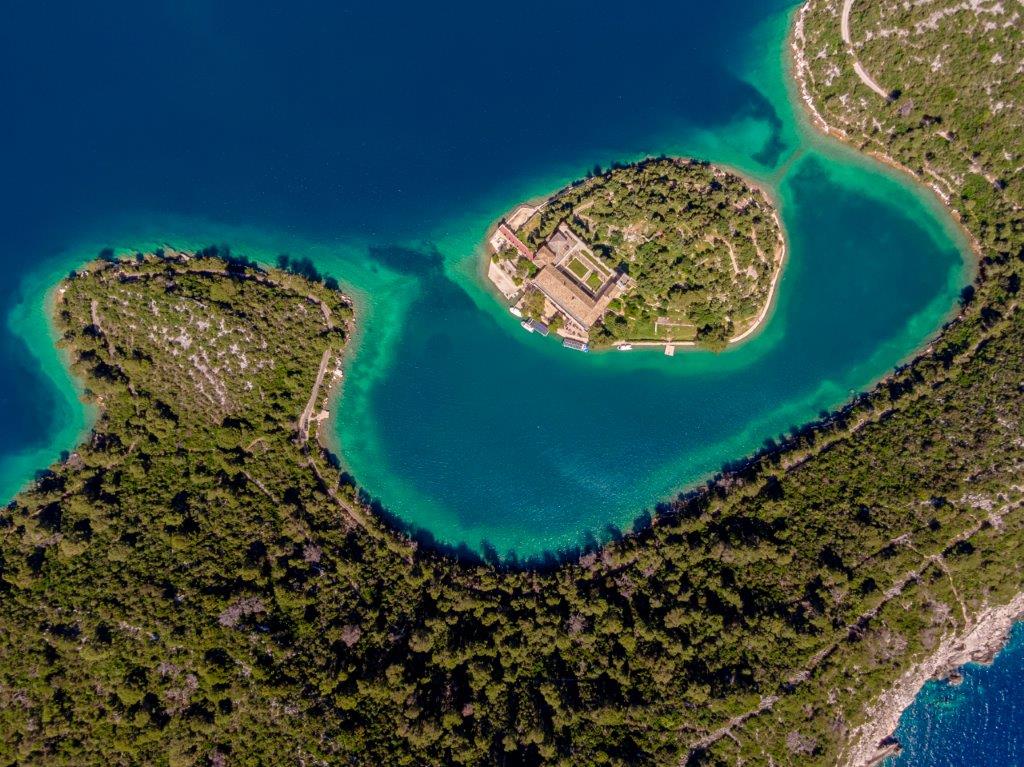 The island of Sveta Marija © Mljet National Park
The island of Sveta Marija © Mljet National Park
The oldest marine protected area anywhere on the Mediterranean, as Mljet National Park stretches over almost 5300 hectares, there's no guarantee these spectacular lakes will be within your view as you volunteer at Mljet. But, you will have plenty of time to explore the park and the island's incredible sights – volunteering hours are restricted to just six hours per day.
Over 40 kilometres of hiking trails run along the shoreline and through the forests of the park. Those who volunteer at Mljet will be asked to clear trails that have become obstructed by winter's strong winds blowing down trees and branches. Any equipment needed for the tasks, like compulsory work gloves, hats and t-shirts, will be provided by park authorities to all who volunteer at Mljet.
The groups required to volunteer at Mljet will be comprised of no less than 6 people and no more than 12 people at a time. You can apply to volunteer at Mljet alone - and maybe make some new buddies - or you can apply to go with a friend or friends. Both English speakers and Croatian speakers are invited to apply. Free accommodation is supplied in the Cullier building, owned by the Park. There are 7 rooms with bunk beds, toilets, showers, kitchen, living room. The building is just 2 km away from the village of Pomene, which has the only hotel on the island, several restaurants and two shops that are open during the summer. All meals are also provided free to those who volunteer at Mljet.
When can I volunteer at Mljet National Park?
Volunteer positions are available between February and November with the following being the specific weeks:
27/02 - 06/03
06/03 - 13/03
21/03 - 27/03
27/03 - 03/04
10/04 - 17/04
17/04 - 24/04
15/05 - 22/05
11/09 - 18/09
25/09 - 02/10
02/10 - 09/10
09/10 - 16/10
Volunteering lasts 7 days, one day of which is a free day - you can explore the park or take part in a tour of the island which the park organises as thanks to all volunteers. Volunteers will work 6 hours a day for the 6-day duration, although this 6 hour period does include one full hour of rest time. If there are unfavorable weather conditions (strong sun, wind, etc.) working hours may be reduced. Volunteers require only physical readiness and the desire to stay and work within a natural, outdoor environment. As the volunteering work requires physical strength and dexterity, these particular positions at the park are sadly not open to those with disabilities. Local transport within the Park is provided. Travel expenses for arrival and departure from the Park are borne by the volunteers themselves.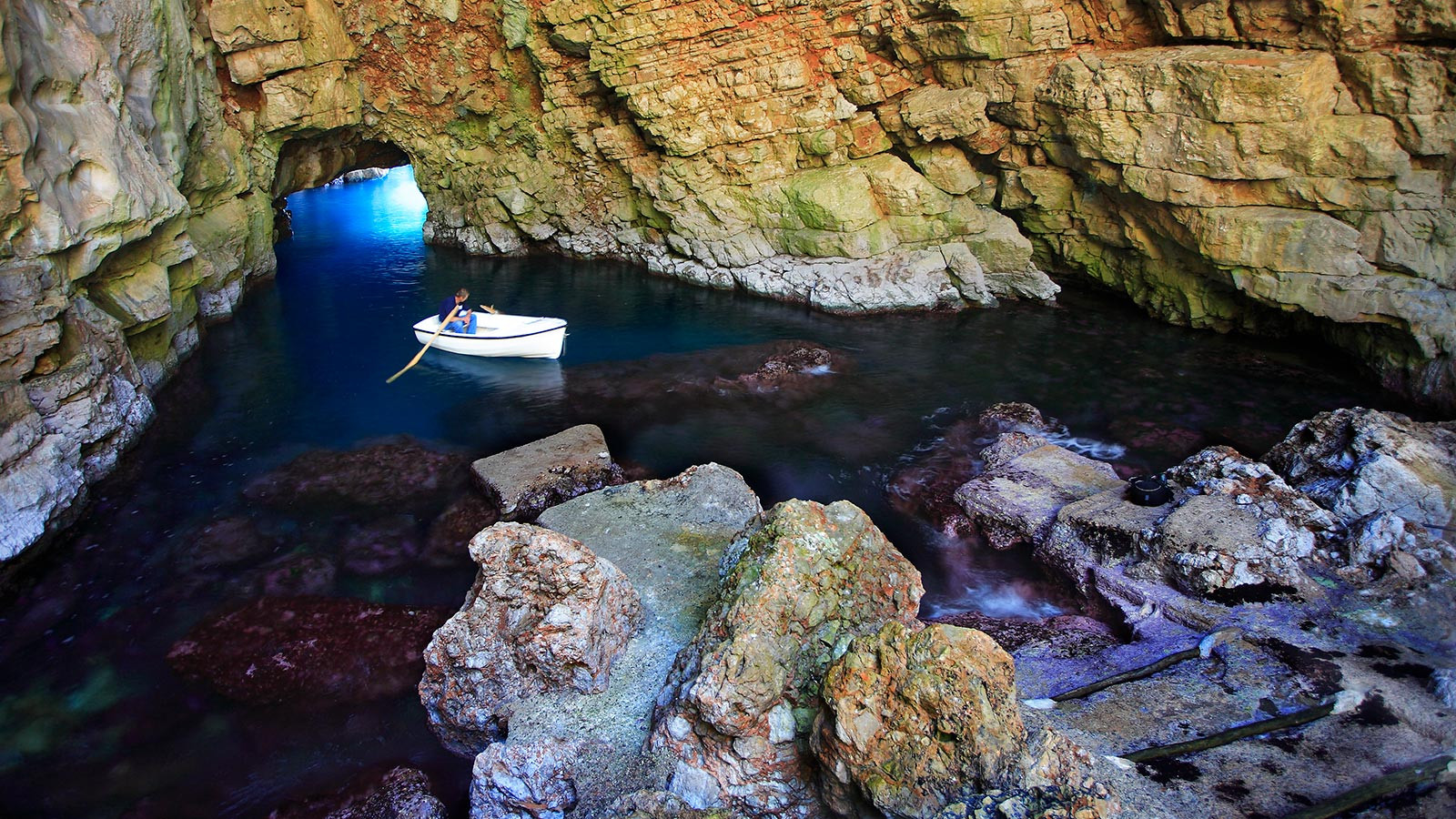 The Ulysses cave on Mljet island © TZ Mljet
The Ulysses cave on Mljet island © TZ Mljet
During the free time you'll have on the island, you can walk, hike or bicycle on the park's trails, rent kayaks and canoes to explore the stunning saltwater lakes, go diving or take diving lessons, rent a scooter or car to explore the whole island and its many sights, or just chill out with your fellow volunteers, park staff and the park's visitors at the accommodation centre or in a local tavern.
Want to extend your stay in Croatia by a week with free accommodation on an incredible island? Got some free time on your hands and an appreciation of the great outdoors? If this opportunity sounds like it might be for you, you can fill in a form and apply here
From Hvar to Tanzania: Young Croatian Volunteers to Help Poor Children
December 5, 2020 – As Croatia counts a record number of coronavirus cases every day, young Croatian Romano Malečić decided to set out on a big journey from Hvar to Tanzania to volunteer as a teacher. On the occasion of the International Volunteer Day which is celebrated today, here is his story from 9000 kilometers away.
While his peers from Hvar were enrolling in college, 19-year-old Romano Malečić had different dreams. In Croatia, taking a gap-year is not as common as in other countries, but Romano decided to do just that – take a break for a year or two after high school and try volunteering in Africa.
"I knew that after graduating from high school I didn't want to enroll in college right away, because I just wouldn't be ready. All this was inconceivable and ridiculous to me, that at the age of 18 when I was just beginning to define and develop as a person, I have to make one of the most important decisions in my life – what college to enroll in or what to do for the vast majority of my life," said Romano honestly, who did not give in even under pressure from the professors to enroll in any college, just to study something.
A last-minute, but firm decision
At no cost did he want to go the standard way to enroll in college after graduating from high school, find a job in the profession after graduation, start a family, and not experience anything interesting in life. For this reason, the choice to pause the year for Roman was quite logical, no matter how hard it was for the people around him.
He says that while making the decisions, he always "goes with the flow", so he made his decision to go to Africa at the last minute, and he planned and realized the whole trip in just one week.

The pandemic did not frighten him at all. Watching European countries close again and tighten epidemiological measures, he looked for a place where he could escape. When he learned that Tanzania was open without any restrictions, and since it had always been his dream to volunteer in that very African country, the question was – now or never.
He bought a plane ticket to Dar es Salaam, the capital of Tanzania, on Wednesday, October 28, told his parents about his decision on Thursday, and took off on Sunday, November 1. Like any worried parent, Roman’s parents initially disapproved of his idea of going to Africa in the middle of a pandemic. However, they tried to understand his decision and eventually let him develop and grow, follow his dreams, regardless of the fear and pressure of society, for what is Romano infinitely grateful to them.
'Children here are honest and happy'
Before the flight, he had to be vaccinated against hepatitis A, typhoid fever, and yellow fever. The trip to Arusha, his destination where he is currently located, took a full 3 days. From Hvar, he first went to Vienna, from where he had a flight via Istanbul to Dar es Salaam, the capital of Tanzania. Upon arrival in Tanzania, he stayed in Dar and finally, after a few days, set off on a 15-hour bus ride to his last stop – Arusha.
"Intensive preparations started only 4 days before the trip, on the day I bought the plane ticket. I didn't know much, except that I'm going, and I planned most of it along the way (except vaccinations), including the volunteering. I decided to look for volunteering opportunities when I arrived in Tanzania," says Romano, not knowing that he would dare to go on such a trip.
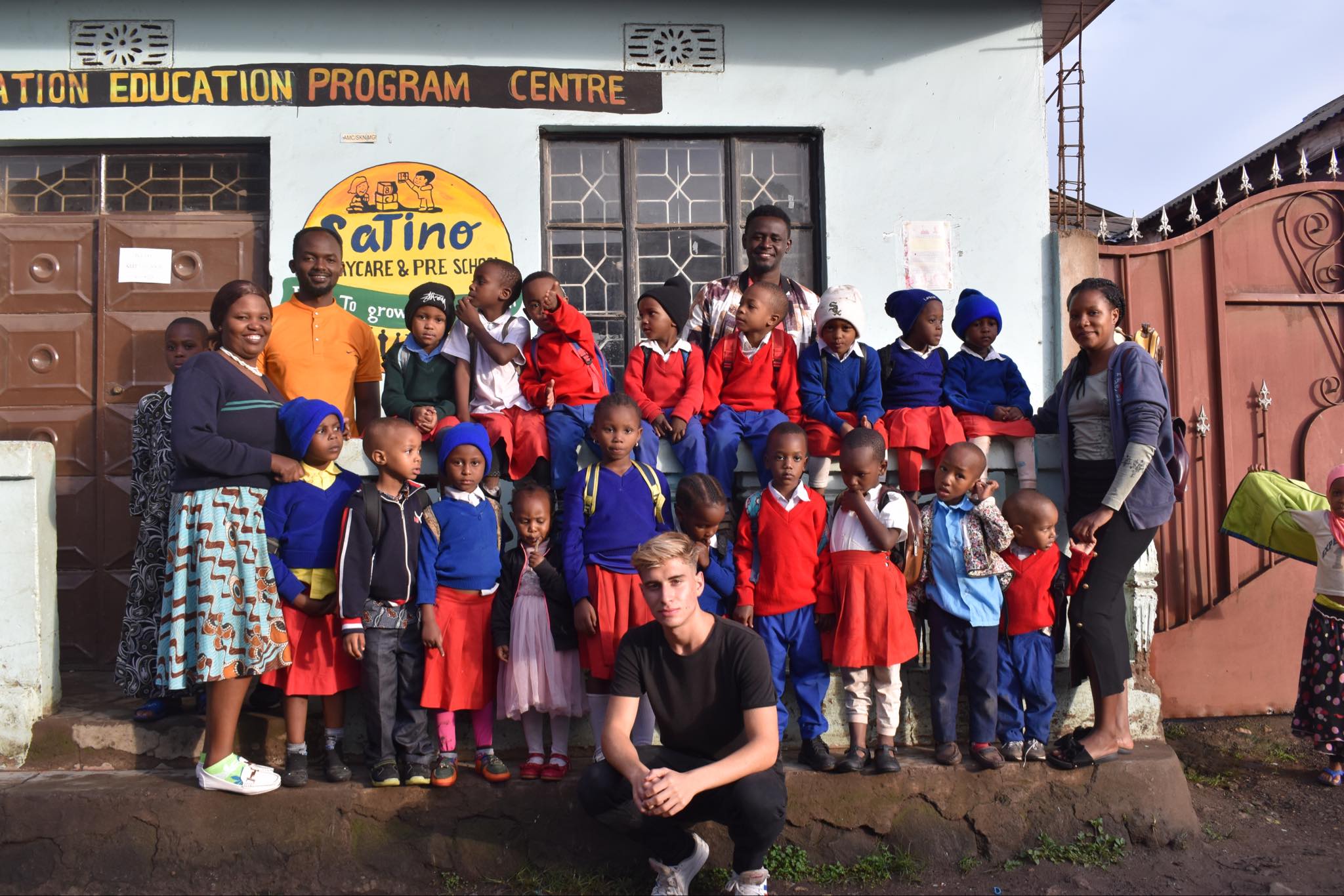
Romano found a volunteering project through the organization SATINO (Save and Teach the Innocent). Now, he helps poor children and teaches them English and math. As he previously explained for Slobodna Dalmacija, employees and volunteers take care of 65 children aged three to six and 25 between the ages of 13 and 17 from seven in the morning until eight in the evening. They are not abandoned, but they come from low-income families and any help is welcome, especially since they have to set aside seven dollars each month for the organization in which Romano volunteers. For some, it is a ridiculous amount, but for these children and their families, it is very unattainable.
As he says, children in Tanzania differ from our children only in the living conditions in which they live.
"There are people who often say that I could have stayed and volunteered in Croatia, and I am aware that there are children in Croatia who also have a tough childhood, but these children depend on the help of others. The hygienic minimum is not met here because there is no soap or running water in the school, and to learn English, they depend on volunteers because there are not enough qualified teachers. They don't have much, they are poor, but honest and happy, because they are not aware that there may be something better out there for them," says Romano.
"They are most interested in white people or 'muzungu' as they often shout after you in passing, which means 'white man' or 'aimless wanderer'. Kids run after you trying to touch you, especially your hair, out of curiosity because you simply stand out whether you want to or not. Those looks, touches, and feats might be ‘too much’ for someone, and they were for me, especially in the beginning while I was still adjusting to a new environment, but when you get used to it and realize that most kids are well-meaning and just curious because they don’t see whites every day, you get used to it. And they love it when you carry them.
He constantly tells African children stories about Croatia, especially about his native Hvar, but also about Dalmatia, food, and fish. The indispensable topic of conversation is, of course, football and Luka Modrić, their great football idol.
This is what his average day of volunteering in Africa looks like:
"From Monday to Friday, I'm already in school at about 8 am because my first class is from 8:30 am to 10:30 am. I'm teaching preschool children, from 3 to 6 years old, 25 of them. Depending on the day, with the help of educator Jackline, we teach them either Swahili, or English, or math. Mostly it’s the basics, numbers, and letters.
After the preschool education and breakfast (fried bananas or ‘ndizi za kukaanga’ as they say here), from 11 am to 1 pm I have a second lesson, English, to prepare 24 children for the high school, what I run on my own.
Around 2 pm, we have lunch together with the children. Most often it is either rice, polenta, bananas, or beans, ie carbohydrates because they are the cheapest. After lunch, the kids go to bed, and we always have some work in between, cleaning, or correcting their exercises and tests," says Romano.
Around 5, when the children wake up, they play and dance until 8 when the parents pick up their children.
After a long day of teaching and playing with the kids, Romano goes home. If it’s Thursday, Friday, or Saturday, then he goes to the club and even to African weddings, where he’s been twice already.
Tanzania is fighting the pandemic in its own way. Their president, after testing watermelon, papaya, and goat on COVID-19, and after testing them "positive," declared the coronavirus pandemic a scam. In Tanzania, therefore, there are currently no restrictions or social distancing, and Romano says he has not seen a single face mask in this one month.
Romano believes that "if an African country can cope with a pandemic, the highly developed West can definitely do too." At the moment, everything is open in Tanzania, cafes, restaurants, and clubs, and people live normally.
'I want to help and there is no going back'
Romano modestly admits that sometimes, despite all the variations of bananas and rice, he misses his mother's food. But he doesn't want to split hairs, because, during his one-month stay in Tanzania, he saw things that, he says, opened his eyes and he could not remain indifferent to the unspoiled smiles of children.
"Behind those smiles, unfortunately, lies a difficult reality that these children are not aware of because they do not even know that there is something better somewhere. As I was lecturing, I saw the materials they use for learning, worn-out pencils taped with duct tape, one eraser for 20 children, torn and printed notebooks, crumbling backpacks, and clothes and shoes not to mention. I will only tell you that uniforms are worn to conceal their clothing and thus to mask material inequality," says Romano, who was therefore encouraged to launch a charity action to collect donations for children's necessities, but also the renovation of their school building.
Namely, the space they are currently using is rented, so it is expensive and unsustainable. They started building their own school building 3 years ago, but construction was suspended due to insufficient material resources.
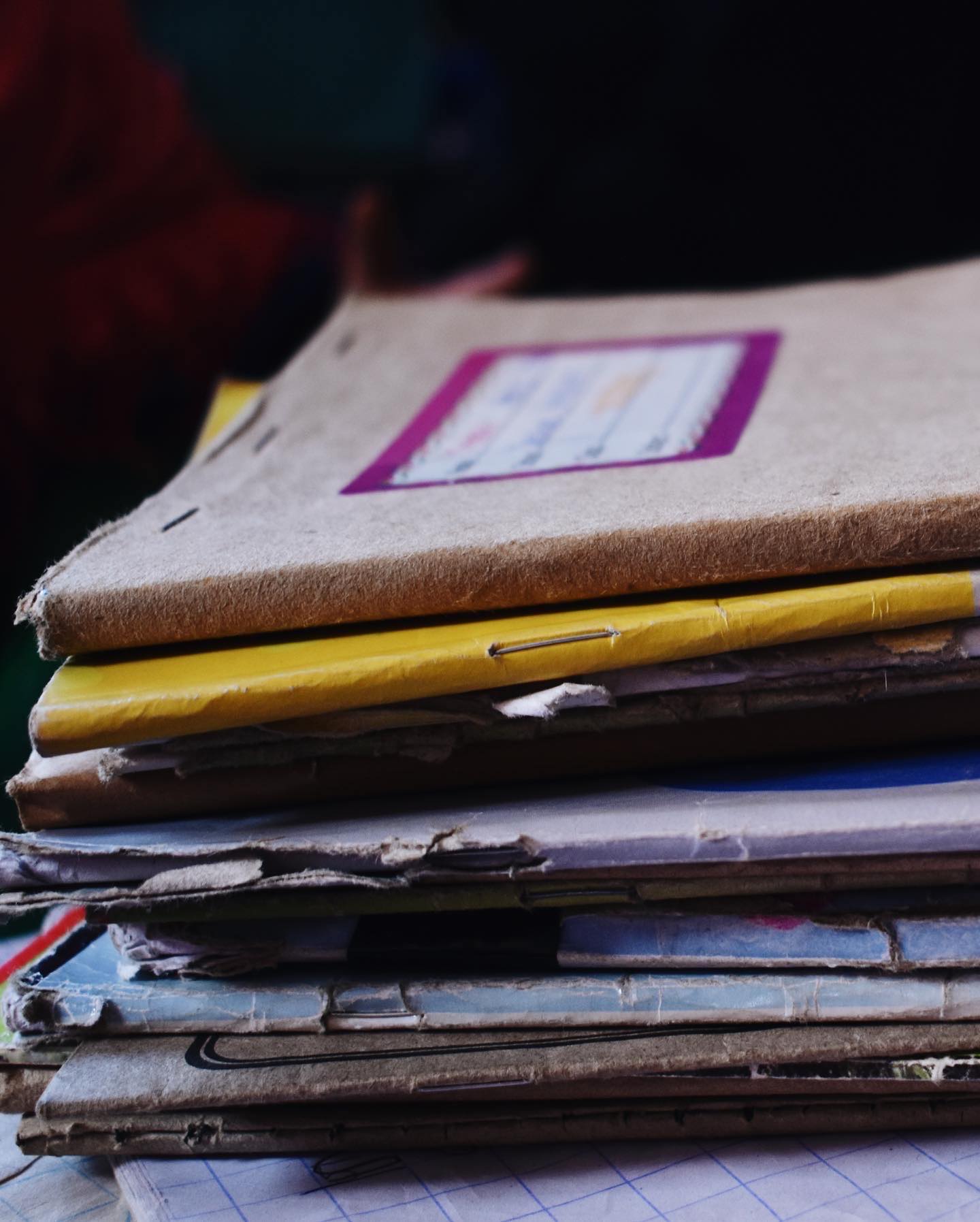
"I think that every child has the right to the basics, including education. It is the only chance for them, I think, the only way out that from this sadly corrupt system that has no interest in the people of this beautiful but massively exploited continent living as befits the 21st century. Education is something that no one can take away from them, it is 'the most powerful tool for changing the world', as Nelson Mandela would say," says Romano. It is for this reason that he wants to help these little ones, 65 of them, on whose future we can influence.
The school building in the making
"Even though I was aware of it before, I realized how privileged I am in life just because I was born a little further north, on another continent. I learned to appreciate more what I have and manage without the basics (running water, shower, toilet), and I also perfected hand washing. As a result, I met a different culture, tested my limits, and looked at things from a different perspective – a gratitude perspective," concludes Romano, hoping that little by little, both he and other volunteers will contribute to positive change through their work.
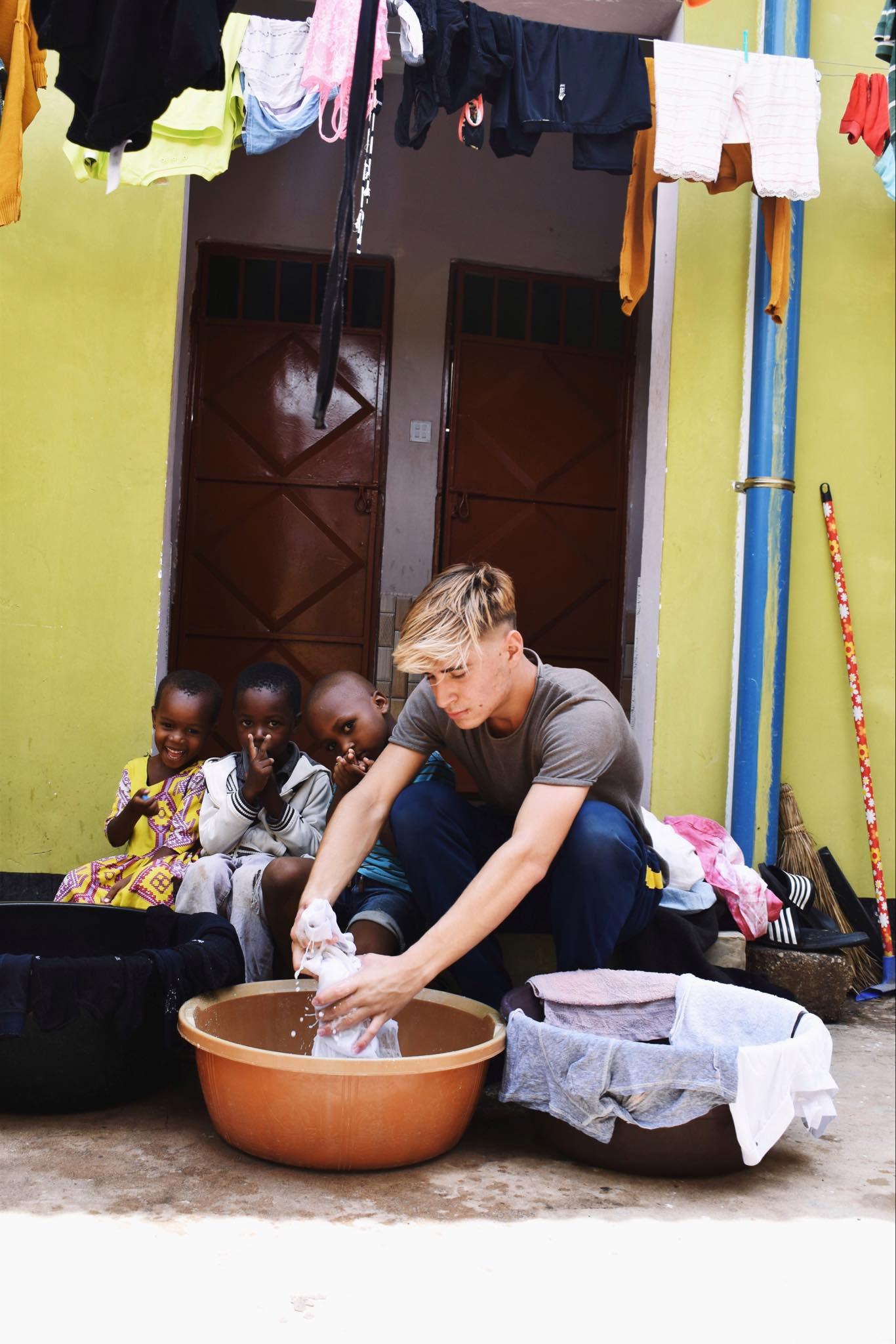
Before Tanzania, he had no previous volunteer experience, but, by all accounts, this is certainly not his last volunteering project in the world. Romano jokingly says he'll come back when the clubs re-open in Europe, but since it is not possible to plan much in advance at the moment, he will go "one step at a time" and plan to return to Hvar along the way.
Romano collects donations for children to buy them school materials, food, and hygiene supplies. If you also want to help, you can make a payment to his account: HR5223400093234047872.
He also launched a fundraising campaign to build a new school building, where you can also help with your donation.
All photos are from Romano Malečić's private archive.
For the latest travel info, bookmark our main travel info article, which is updated daily.
Read the Croatian Travel Update in your language - now available in 24 languages.
Meet Zagreb Volunteers, the Heart and Soul of the City
October 29, 2020 - TCN joins Zagreb Volunteers Centre in Čučerje to find out who are the Zagreb volunteers and why they do what they do. Čučerje is a semi-rural community which lies at the epicentre of the March 2020 earthquake.
By the time we ran out of the building, the first tremor had stopped. At 6:25am, the asphalt road lay quiet and motionless. People in pyjamas, nightgowns or underwear stood on the pavement. Others emerged even later. Although masonry in other parts of the city continued to fall, the 5.5 magnitude earthquake that visited Zagreb on 22 March 2020 was over. It had lasted much less than a minute. Its repercussions would last much longer.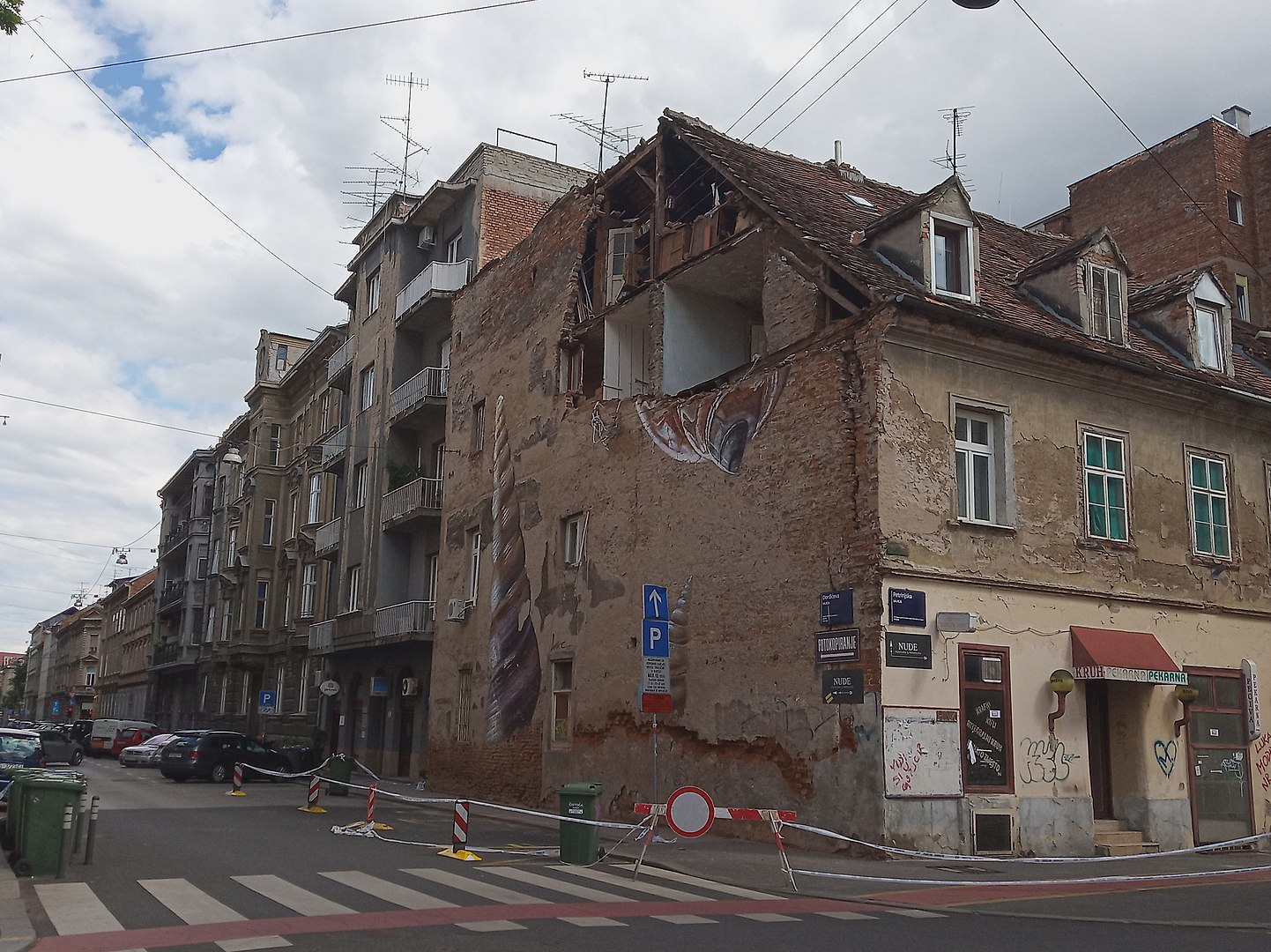 Damage to a Zagreb city-centre building in the 2020 earthquake © Franjo Tahy
Damage to a Zagreb city-centre building in the 2020 earthquake © Franjo Tahy
The tragic news of a fatality filtered through the media several hours later, as did pictures of the devastation visited upon the Croatian capital's buildings. Some of its oldest were hit particularly hard. However, most modern constructions had emerged largely unscathed. Acknowledging the area's seismic capabilities, everything built after the 1963 earthquake of Skopje in neighbouring Macedonia had been constructed to withstand such force.
Offers of help soon began to arrive from overseas. Despite international struggles related to Coronavirus, many still had sympathy upon hearing of the Zagreb earthquake. This outside sympathy and the media that prompted it were rarely directed to the semi-rural communities which experienced the earthquake's fiercest force.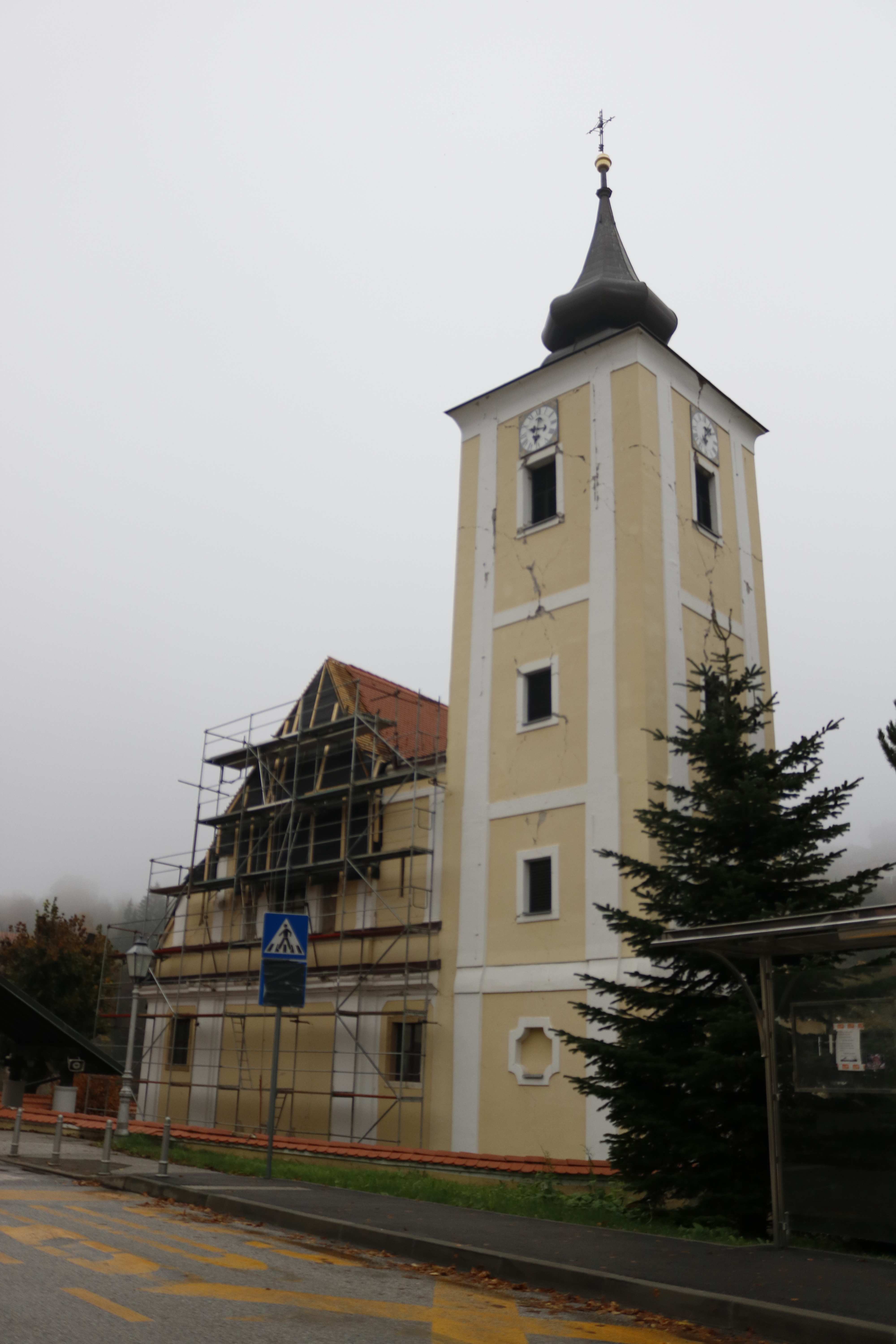 The front of the town church in Čučerje, surrounded by scaffolding seven months after the earthquake
The front of the town church in Čučerje, surrounded by scaffolding seven months after the earthquake
The small town of Čučerje is just short of 11 kilometres to the north-east of Zagreb city centre. In late October, the town looks impossibly pretty – houses perched in the foothills of Mount Medvednica, surrounded by greenery and trees exploding in a myriad of autumn shades. But, behind the colourful exterior lies a hidden suffering.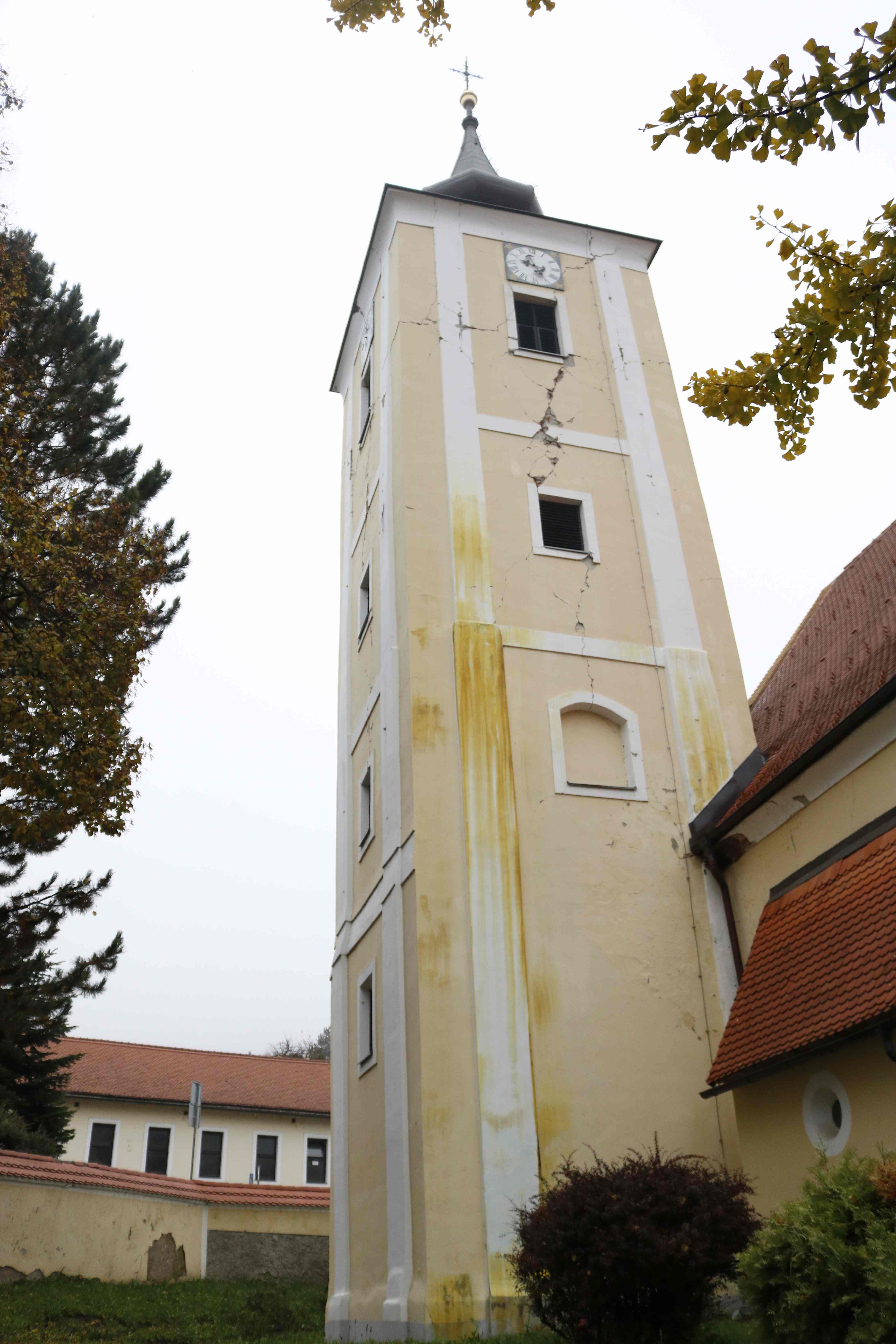 The spire of Čučerje's church is scarred on all sides by long-veined cracks
The spire of Čučerje's church is scarred on all sides by long-veined cracks
Čučerje lies just 500 metres from the epicentre of the earthquake. Scaffolding bolsters the town church, its spire scarred on all sides by long-veined cracks. Back from the main road, down simple, country lanes, sit houses much older than those standng proud above the centre. Here, life still exists in a way similar to that of the original residents of such dwellings. Elderly neighbours are preparing to heat their homes by wood-fired burners, chasing away the chill seeping in through the cracks the earthquake has left. As winter approaches, such hardships are not always reported as loudly as those faced by the damaged cultural institutions holding priceless collections in the capital. But, the struggle does not go unnoticed by Zagreb Volunteers Centre (VCZ).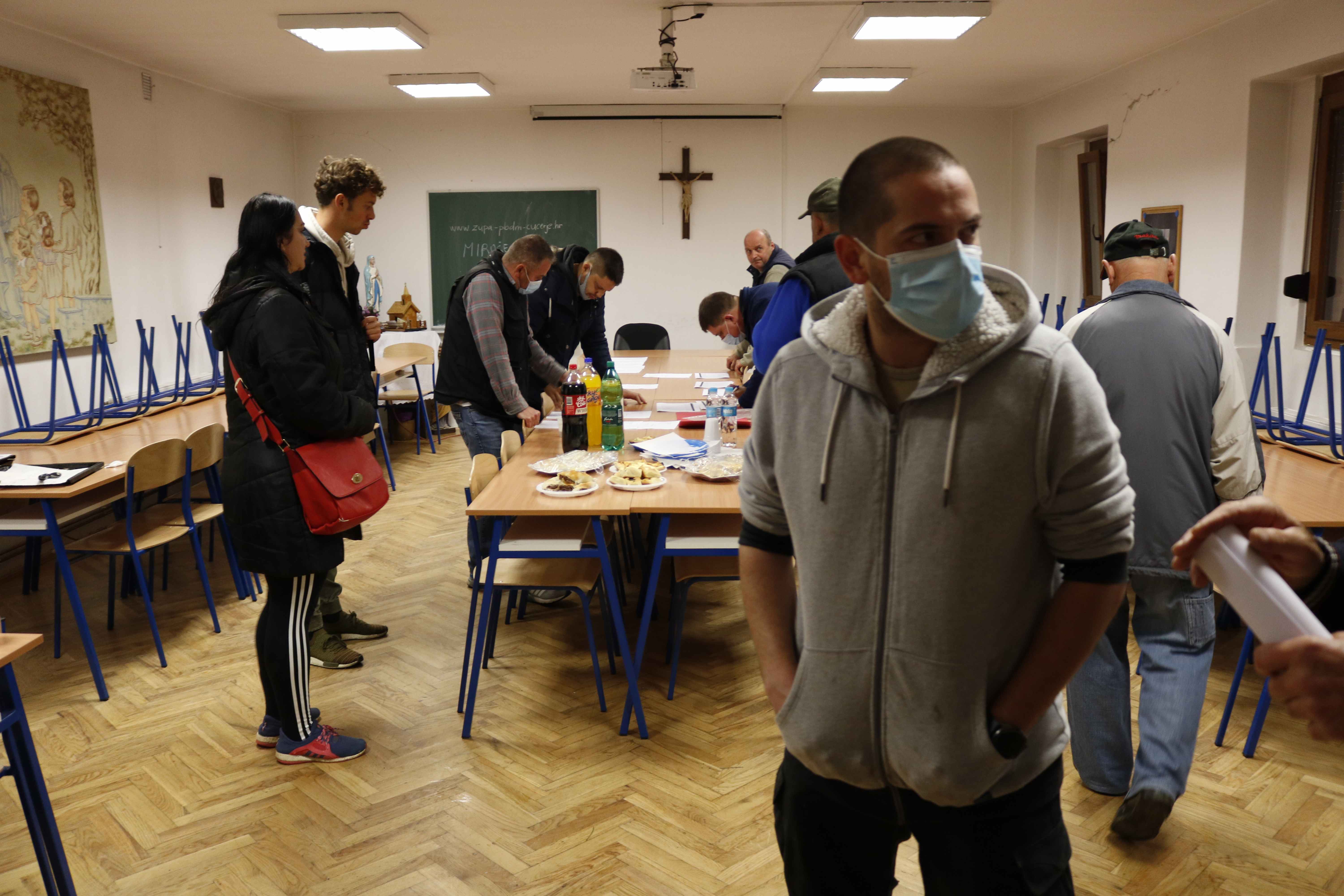 Čučerje residents and members of Zagreb Volunteers Centre meet in the community centre to plan the day's action
Čučerje residents and members of Zagreb Volunteers Centre meet in the community centre to plan the day's action
Established in 1998, Zagreb Volunteers Centre acts as a conduit between charities, communities and non-profit organisations who need support and those willing to donate their time to good causes. Since it was formed, over 18, 000 people have submitted their names to the centre as potential Zagreb volunteers who may be called upon. The centre has helped over 700 organisations find Zagreb volunteers.
“Before 1996, there was a set-up that facilitated international volunteering - it helped connect Croatians with international actions that were looking for help,” says 28-year-old Dunja Hafner, who works for Zagreb Volunteers Centre. “But, it was noticed that some people couldn't commit to an overseas trip and that others simply just preferred only to volunteer locally. The logical step was to move into facilitating that.”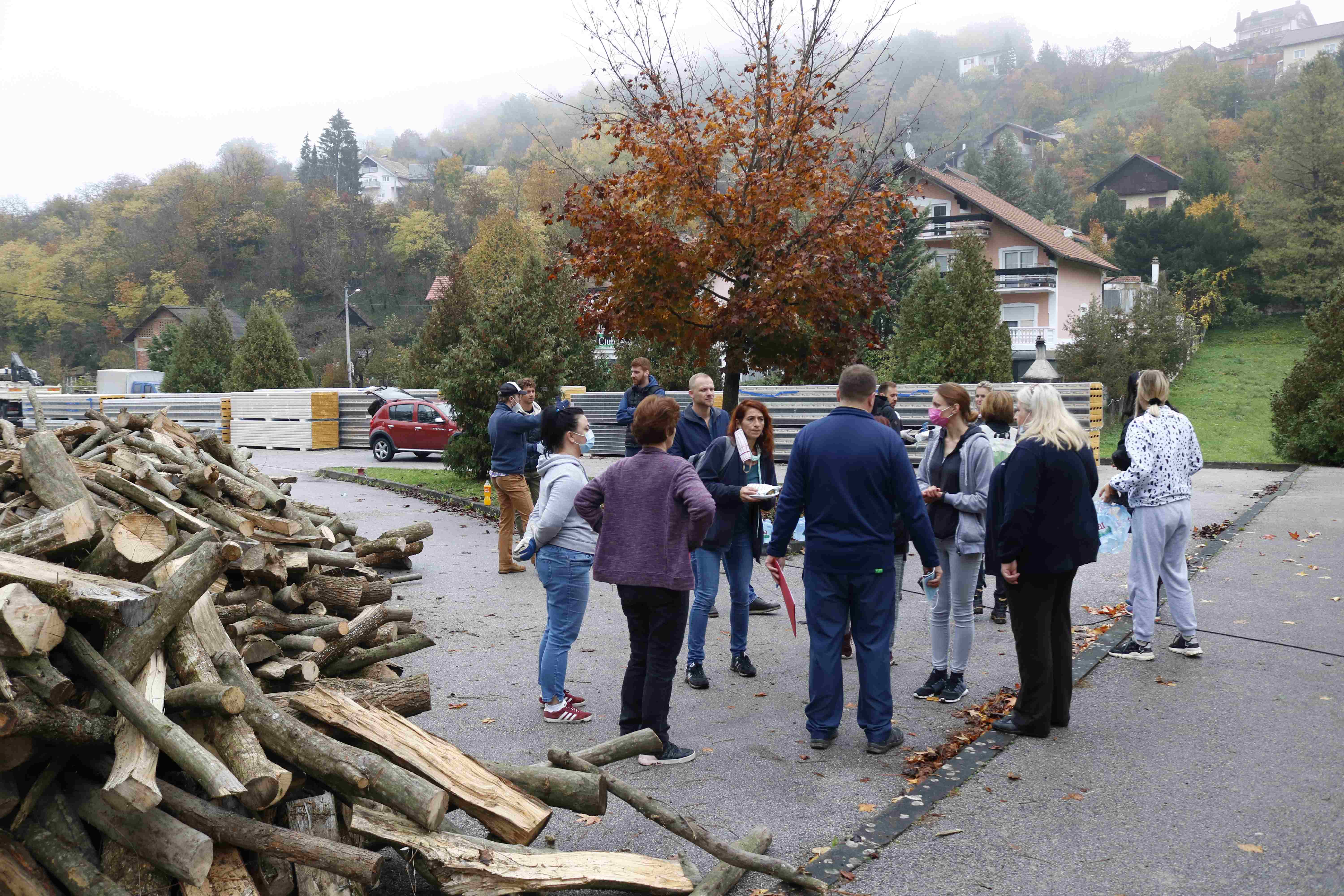 Zagreb volunteers gather in the early morning mist
Zagreb volunteers gather in the early morning mist
“Since we started, the numbers of Zagreb volunteers in our database has grown steadily. But, over more recent times, volunteering does seem to have become a more popular thing to do. And, many people have put their names forward for volunteering since the advent of the earthquake. In the immediate aftermath, there were so many people volunteering that we had to just direct people to the specific groups who were appealing for help. We even had to turn down some Zagreb volunteers who offered their time. That had never previously happened in the history of the organisation. Now, we are managing better and we help co-ordinate some of the actions ourselves.”
“Before the earthquake, the main volunteering areas to which we would send people were actions for children, the elderly, events like culture, sports and music festivals, animals, ecology projects and nature conservation.”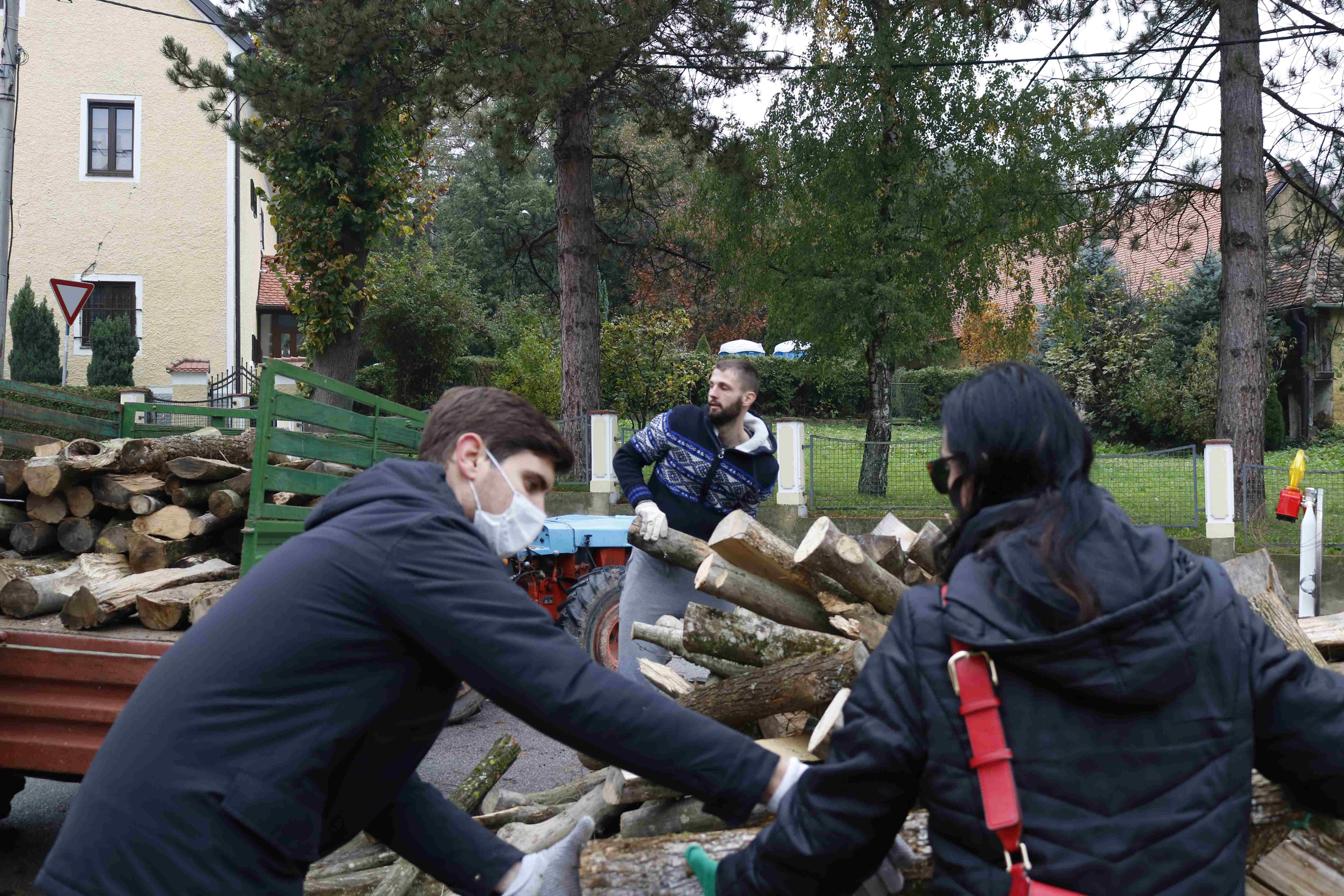 My name is Dražen Blažević (centre), I was born in Croatia. My mother and grandparents are all from Zagreb. This is the city where I live. At the moment, I don't have regular employment, so I can afford to give my time to an action like this. While I'm looking for a full-time job, I make ends meet by doing food deliveries on my bicycle. Why am I here today? Honestly, it was only two weeks ago that I just had this feeling that I should give my time to help people. In one minute I decided I would volunteer. Before this, the kind of help I would give was only to my neighbours, the elderly relatives of friends. People like that. As an official volunteer, this is my first time. Maybe this sounds a little selfish, but I thought it would make me feel good.
My name is Dražen Blažević (centre), I was born in Croatia. My mother and grandparents are all from Zagreb. This is the city where I live. At the moment, I don't have regular employment, so I can afford to give my time to an action like this. While I'm looking for a full-time job, I make ends meet by doing food deliveries on my bicycle. Why am I here today? Honestly, it was only two weeks ago that I just had this feeling that I should give my time to help people. In one minute I decided I would volunteer. Before this, the kind of help I would give was only to my neighbours, the elderly relatives of friends. People like that. As an official volunteer, this is my first time. Maybe this sounds a little selfish, but I thought it would make me feel good.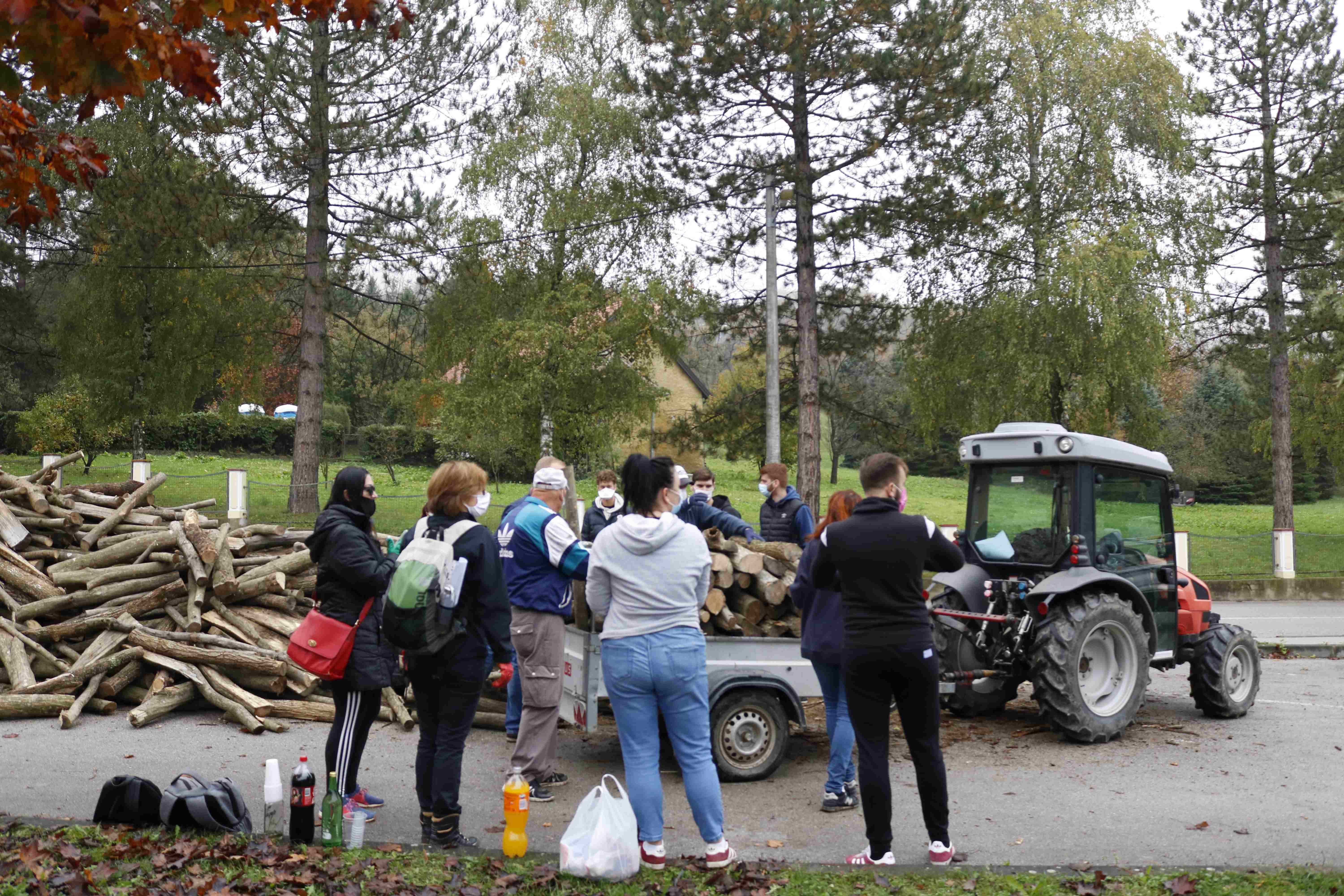
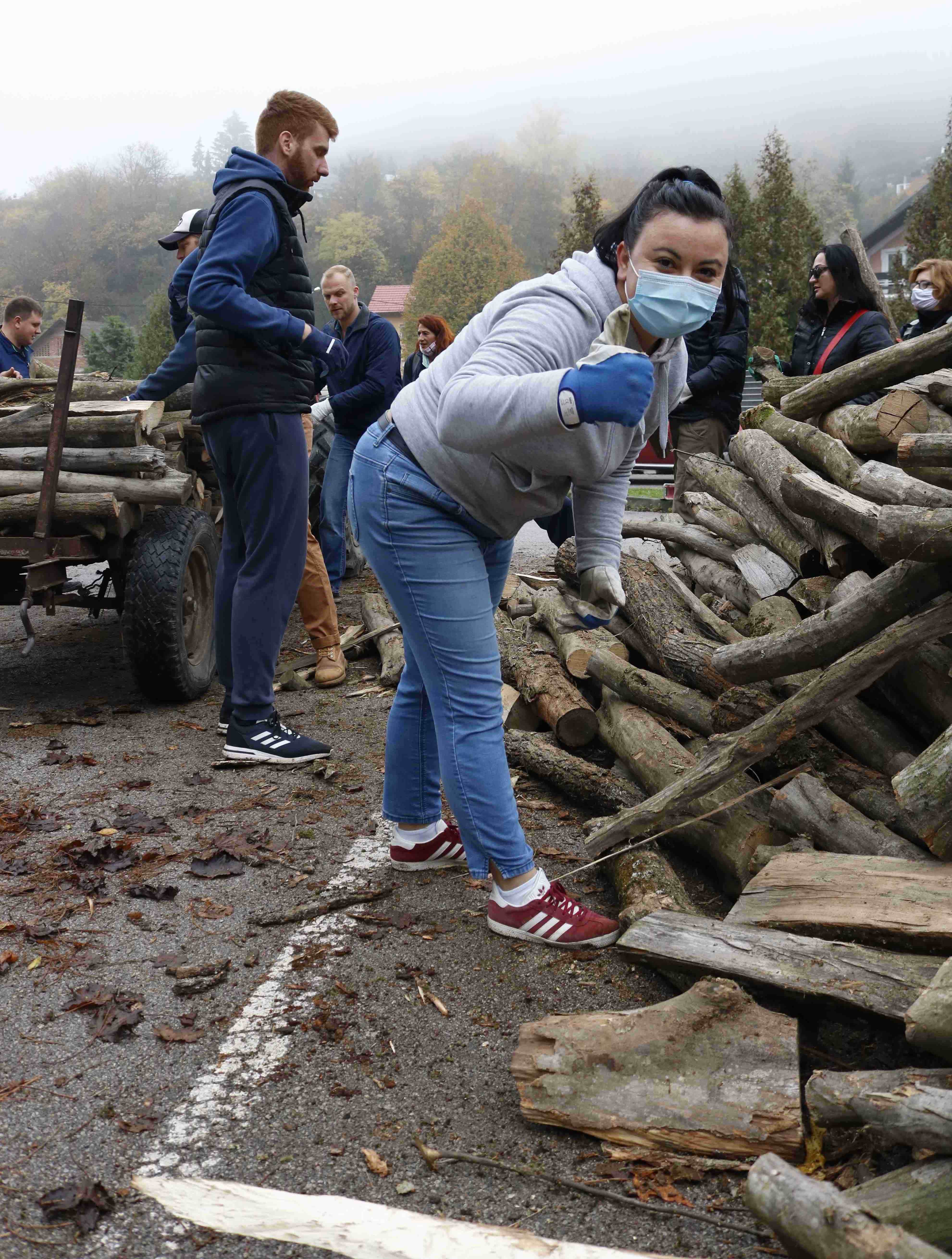 My name is Alexandra and I am from Čučerje. I live here with my family. Right now, I am without a full-time job, so I take on some other daily obligations – I accompany kids to kindergarten and school, and I help out in our local church. I look after their social media pages for them. I also play the organ in the church. It was a very simple decision for me to join in with today's action – I live here. I walk past the devastation left by the earthquake every day. This town has experienced lots of problems because of the damage. For me, giving my time today is a way of showing the love I have for my town and the people who live here. Well, something like that.
My name is Alexandra and I am from Čučerje. I live here with my family. Right now, I am without a full-time job, so I take on some other daily obligations – I accompany kids to kindergarten and school, and I help out in our local church. I look after their social media pages for them. I also play the organ in the church. It was a very simple decision for me to join in with today's action – I live here. I walk past the devastation left by the earthquake every day. This town has experienced lots of problems because of the damage. For me, giving my time today is a way of showing the love I have for my town and the people who live here. Well, something like that.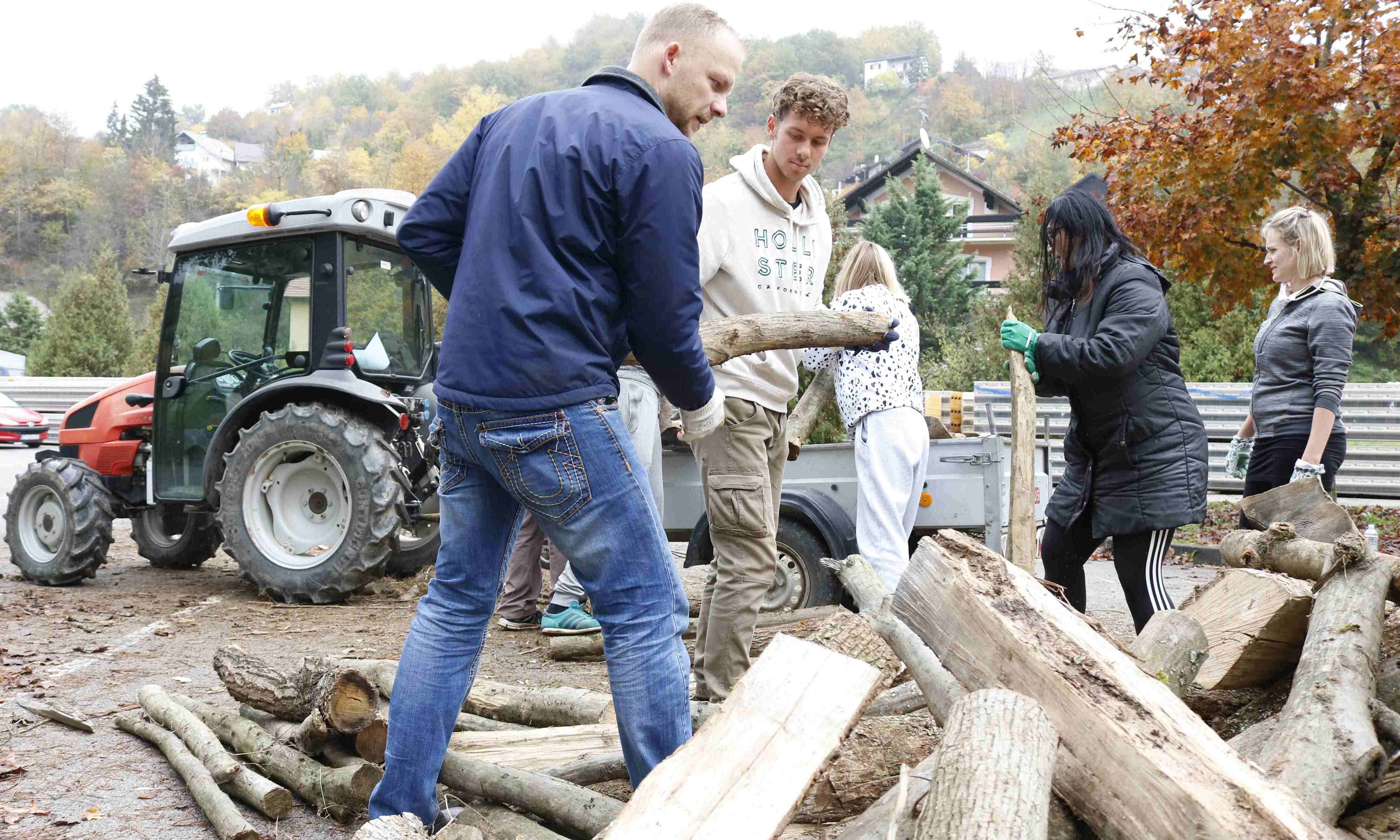
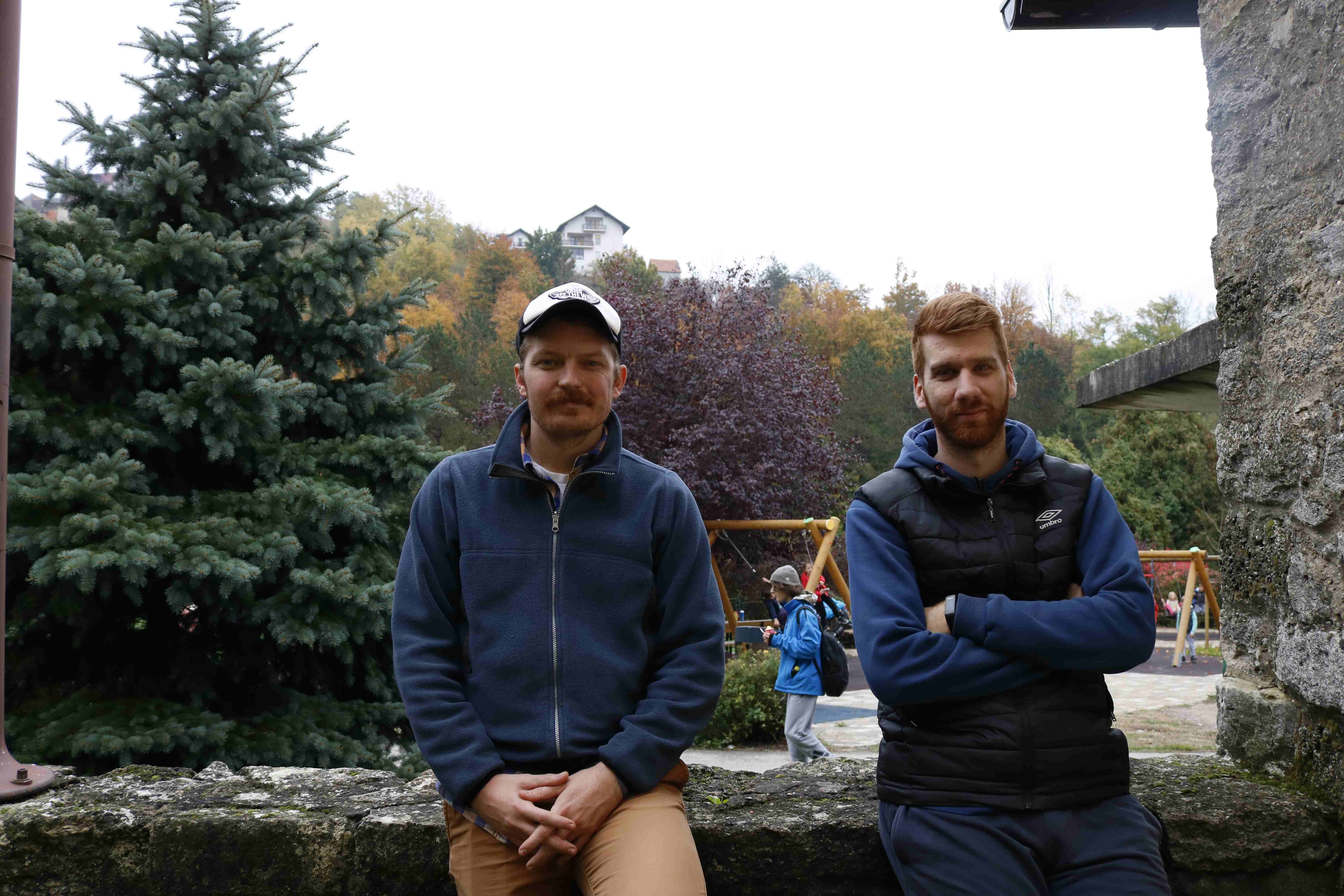 My name is Borut Babanić (right) and I'm from Zagreb. I work as a project manager. I wanted to volunteer so I could help people. The residents of Čučerje are some of the worst affected by the earthquake and so that's why I want to come here specifically. I wanted them to not feel that they are alone. This is the first time I joined an action via the Zagreb Volunteer Centre.
My name is Borut Babanić (right) and I'm from Zagreb. I work as a project manager. I wanted to volunteer so I could help people. The residents of Čučerje are some of the worst affected by the earthquake and so that's why I want to come here specifically. I wanted them to not feel that they are alone. This is the first time I joined an action via the Zagreb Volunteer Centre.
My name is Antonio Frinčić (left). I'm from Zagreb. I work for the Croatian Foundation For Children. It's an organisation that assists in looking after children and families who have small incomes or limited means. It's a state-funded organisation. My position there is a paid one. This is not the first voluntary work I've undertaken, but it is the first time I have volunteered through the Zagreb Volunteer Centre. My answer is the same as Borut's – I came here because I wanted to help these people.
Borut and Antonio are pictured side-by-side because they spent most of the day working together. When they arrived in the morning, they were strangers. They left as friends.
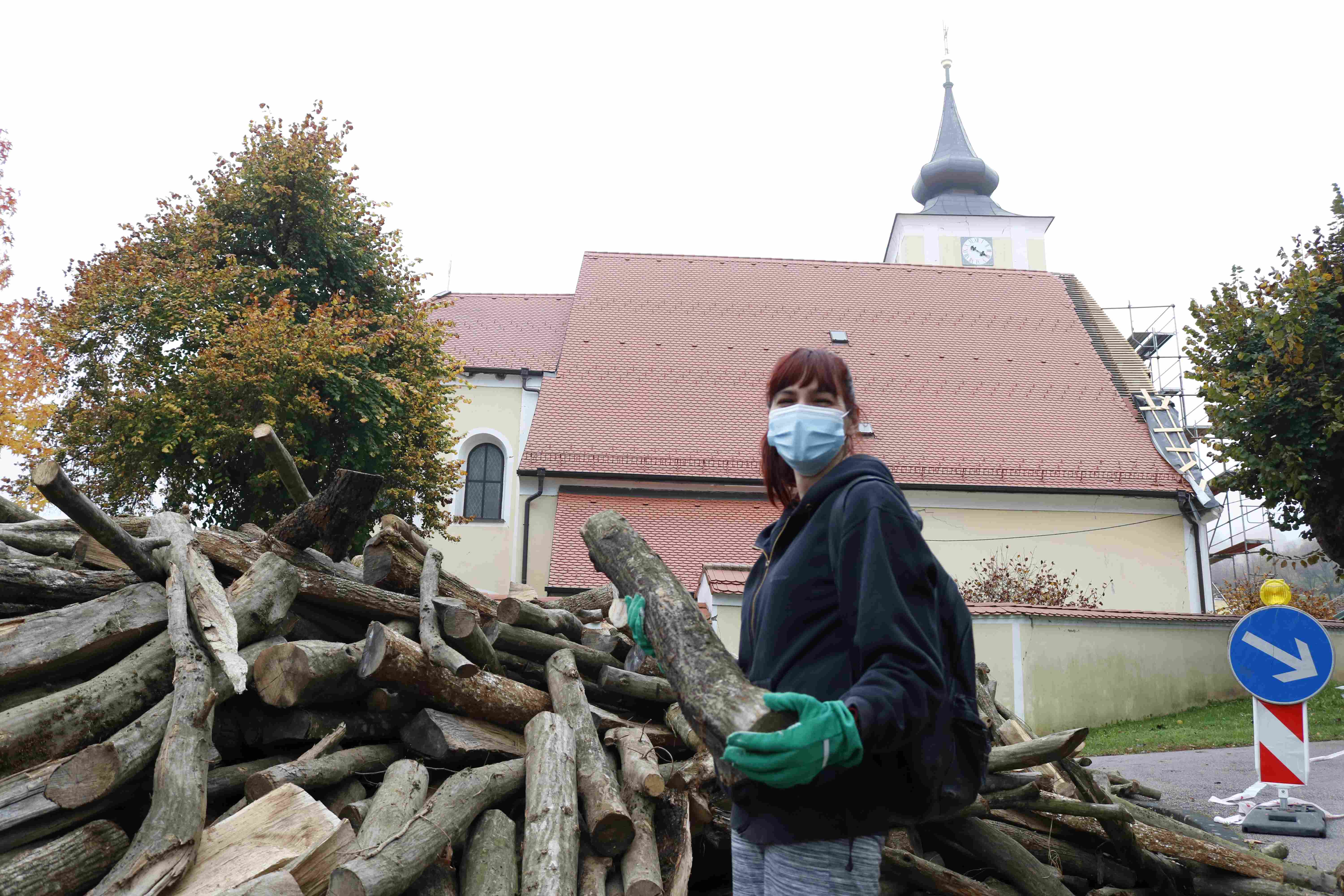 My name is Marina Krolo and I'm originally from Split. I studied in Zagreb, finished university here and then stayed. My regular role in society is that I'm a tour guide and tour leader. That pretty much means that this is my year off, ha! There's not much work for a tour guide in 2020, so I'm trying to put my free time to good use. This is the first time I've volunteered through Zagreb Volunteer Centre.
My name is Marina Krolo and I'm originally from Split. I studied in Zagreb, finished university here and then stayed. My regular role in society is that I'm a tour guide and tour leader. That pretty much means that this is my year off, ha! There's not much work for a tour guide in 2020, so I'm trying to put my free time to good use. This is the first time I've volunteered through Zagreb Volunteer Centre.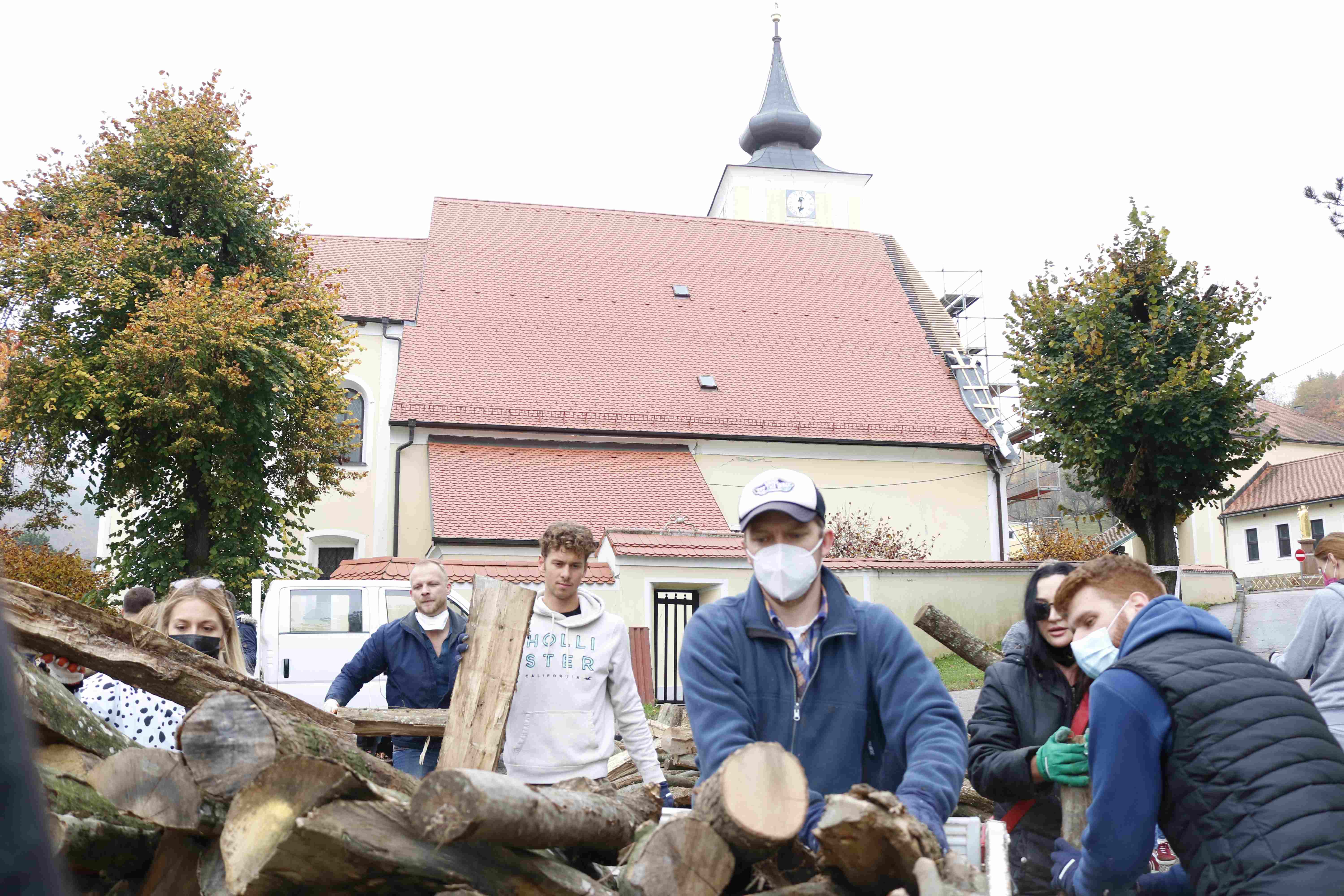
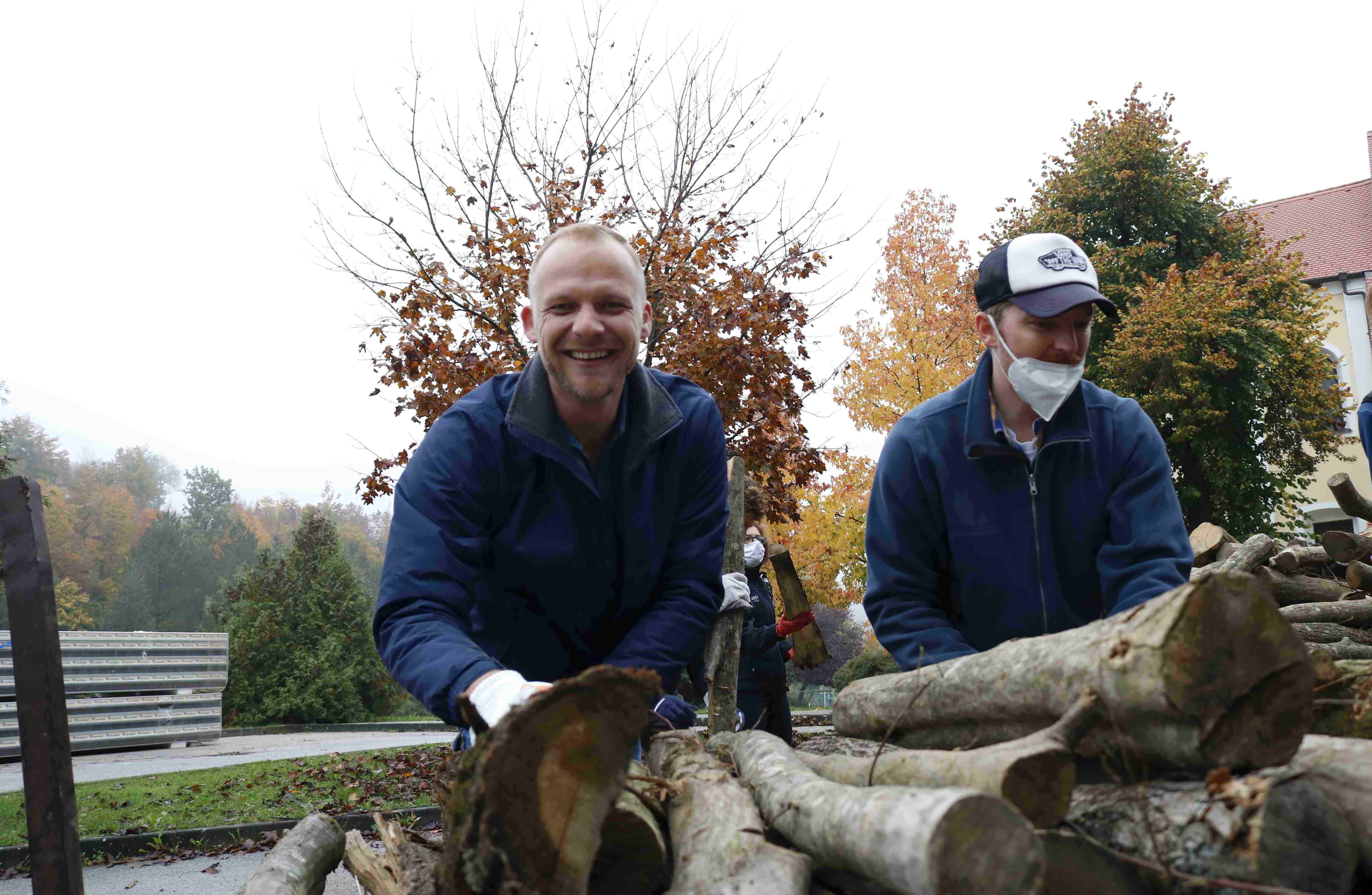 My name is Vincent Matijaca. I was born in Split. I'm based in Zagreb now. We opened a company BioCro LTD in the United Kingdom a few months ago. What we're trying to do is assist small producers and OPGs from this region to place their products internationally, including the UK and other countries in Europe. Why am I here today? Well, we believe that you can't start promoting sustainability and help solely from the office, we believe our project to be more hands-on. By doing that we hope to be able to show what we're about, and to set an example that perhaps others will follow. We've previously joined actions through other Croatian volunteer organisations and others internationally, but this is the first time we've done so through Zagreb Volunteer Centre.
My name is Vincent Matijaca. I was born in Split. I'm based in Zagreb now. We opened a company BioCro LTD in the United Kingdom a few months ago. What we're trying to do is assist small producers and OPGs from this region to place their products internationally, including the UK and other countries in Europe. Why am I here today? Well, we believe that you can't start promoting sustainability and help solely from the office, we believe our project to be more hands-on. By doing that we hope to be able to show what we're about, and to set an example that perhaps others will follow. We've previously joined actions through other Croatian volunteer organisations and others internationally, but this is the first time we've done so through Zagreb Volunteer Centre.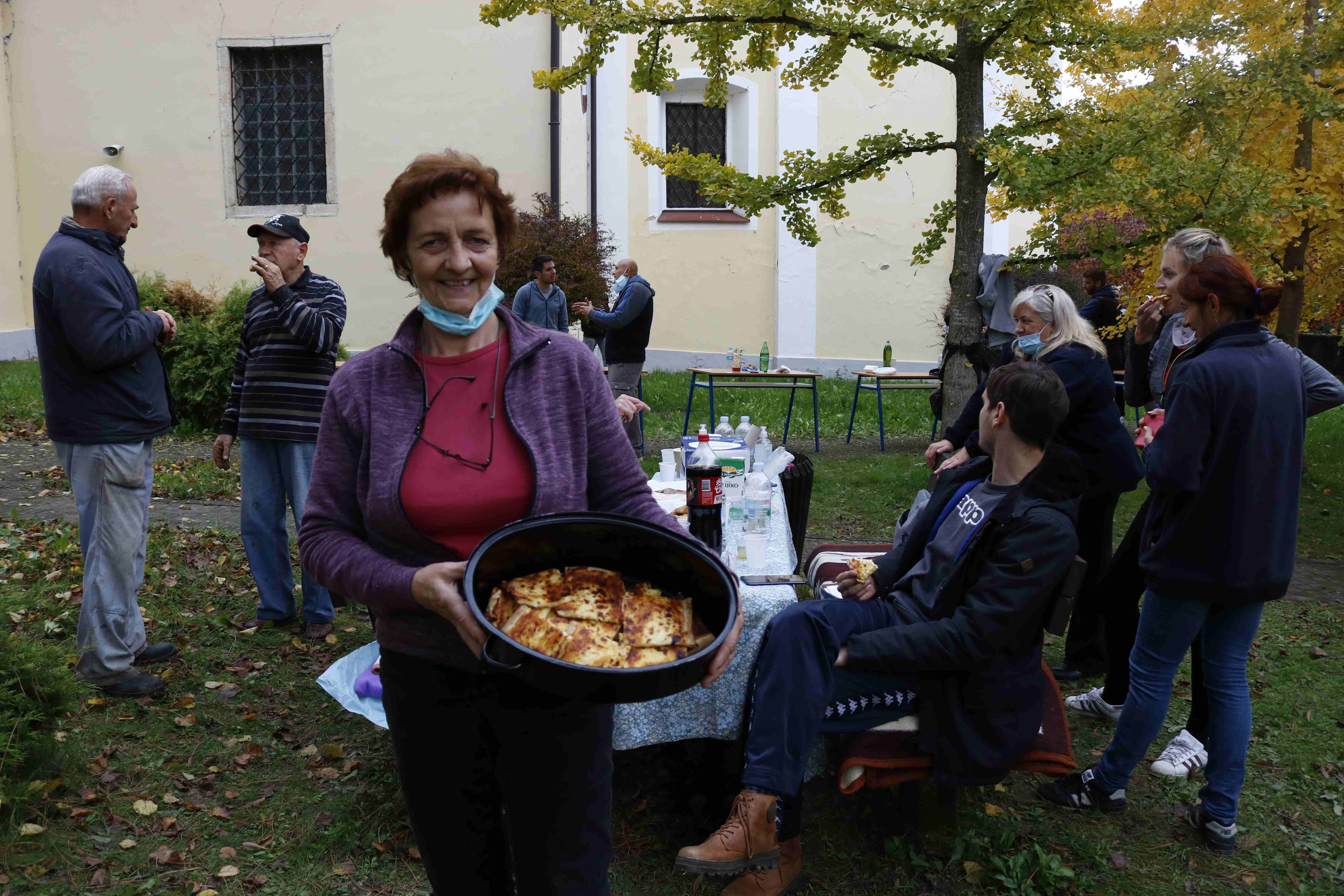 Local people from Čučerje and the surroundings had prepared food to make sure the volunteers didn't go hungry. This dish was made and donated by a local hairdresser. It is a local speciality called tenka gibanica. It was delicious.
Local people from Čučerje and the surroundings had prepared food to make sure the volunteers didn't go hungry. This dish was made and donated by a local hairdresser. It is a local speciality called tenka gibanica. It was delicious.
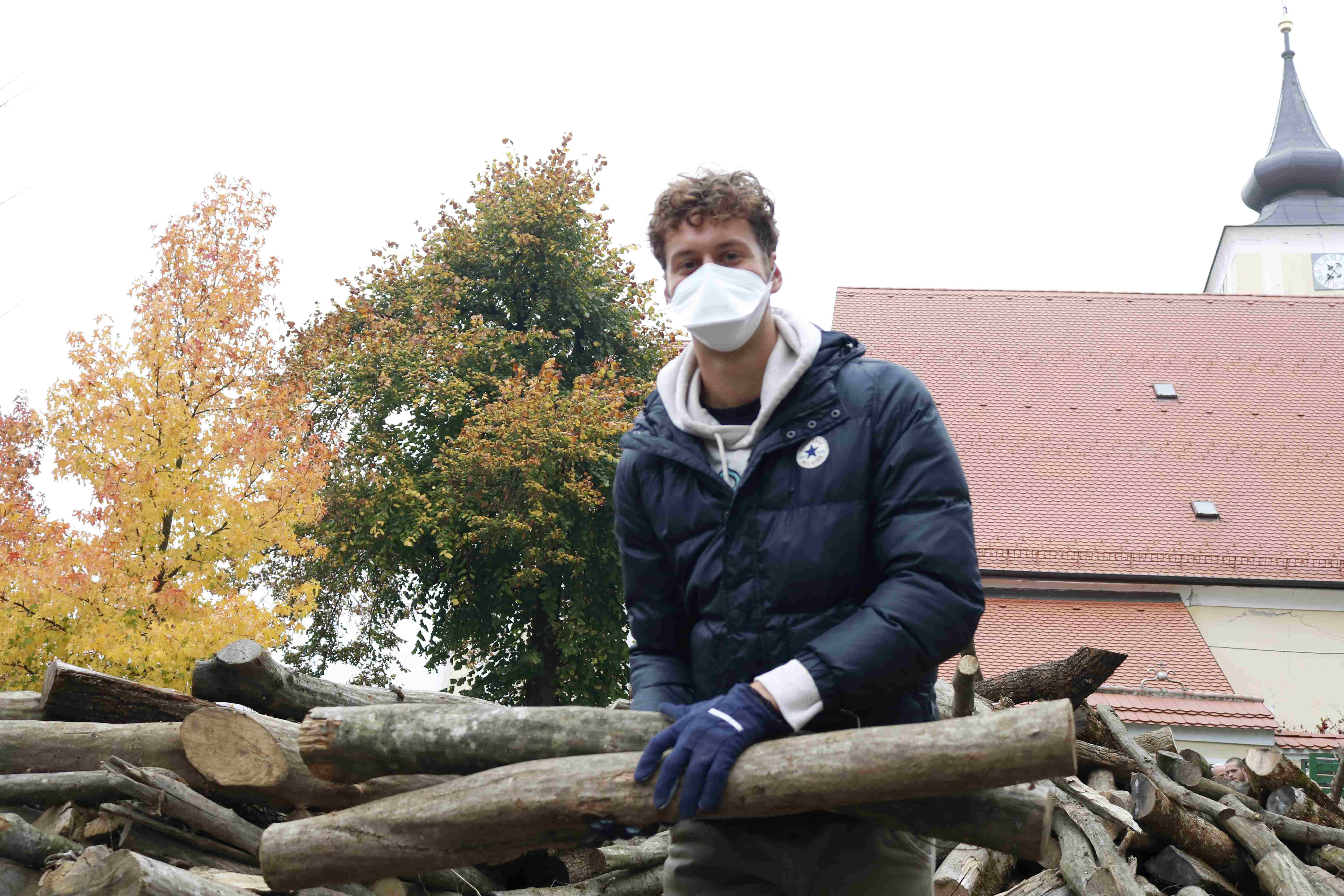 My name is Tomislav Vlajčić and I'm from Zagreb. At the moment, my regular time is spent studying economy and training football. I'm the team leader of a faculty-related group Tourism Lab that's interested in that area of our economy. This is my first time volunteering. I decided to come because it's a good opportunity to help people who are in need and I'm really glad I came. The experience was really worth it and meeting new people, seeing a slightly different culture is priceless. I would recommend it to anyone because it all starts with us.
My name is Tomislav Vlajčić and I'm from Zagreb. At the moment, my regular time is spent studying economy and training football. I'm the team leader of a faculty-related group Tourism Lab that's interested in that area of our economy. This is my first time volunteering. I decided to come because it's a good opportunity to help people who are in need and I'm really glad I came. The experience was really worth it and meeting new people, seeing a slightly different culture is priceless. I would recommend it to anyone because it all starts with us.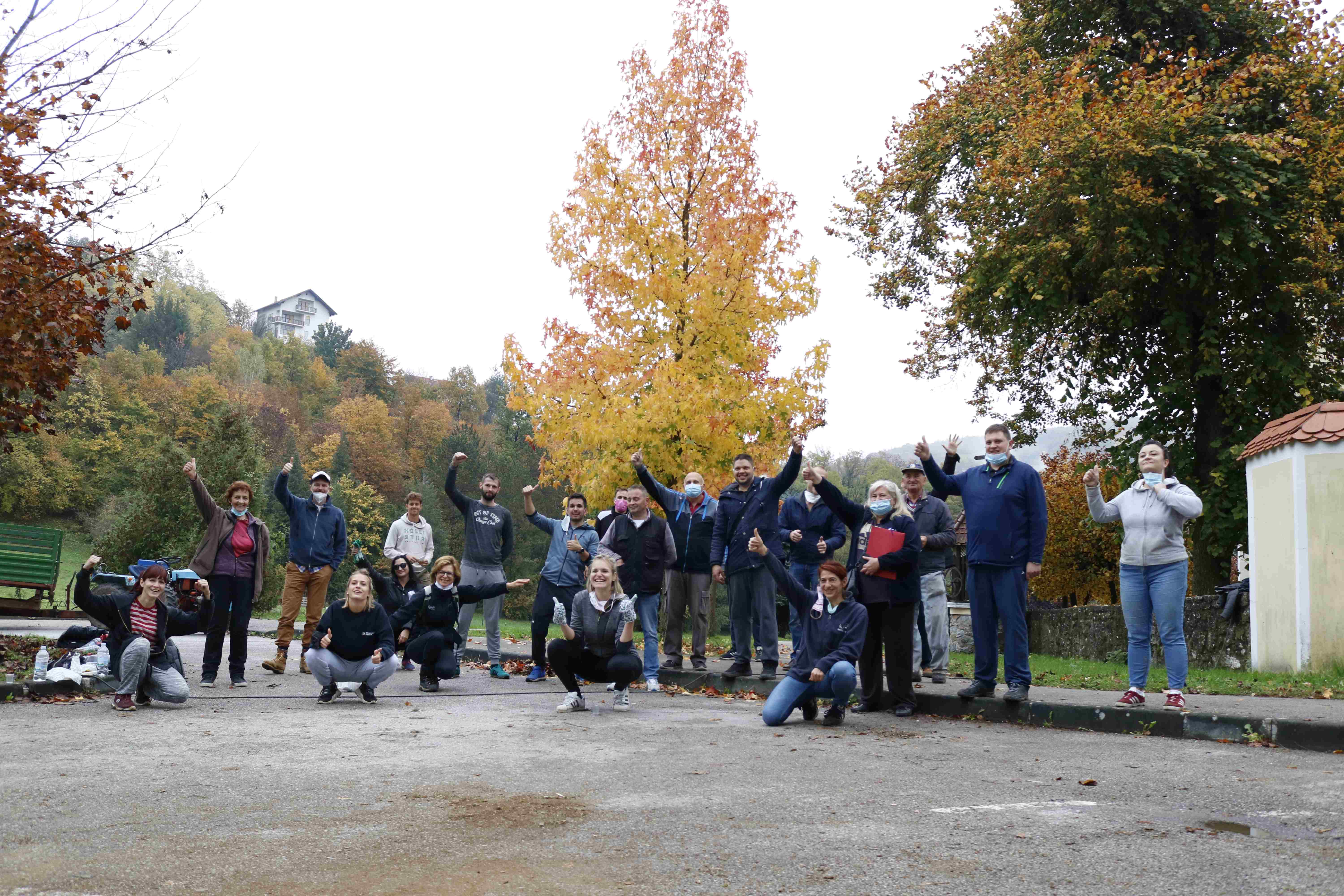
For the latest travel info, bookmark our main travel info article, which is updated daily.
Read the Croatian Travel Update in your language - now available in 24 languages.
Keeping the Coast Clean: Sign up for Eco Patrol in Telašćica Nature Park!
The commendable volunteer programme aiming to clean up an astonishing Croatian natural gem doubles as a free vacation. Sounds good?
Split and Sinj Join Largest Volunteer Marathon in Croatia
“72 Hours Without Compromise” is the largest volunteer marathon in Croatia.


